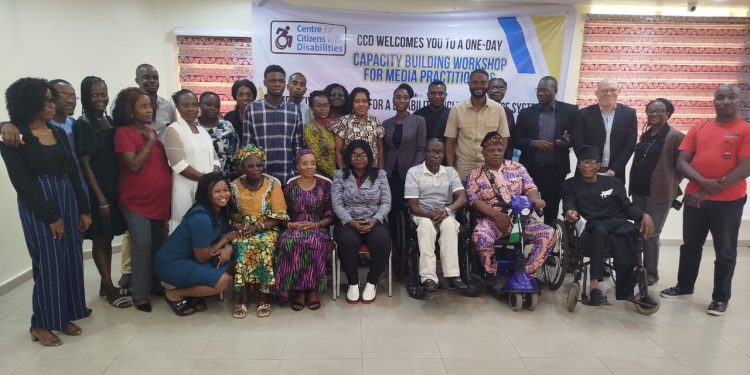The Centre for Citizens with Disabilities (CCD) has empowered journalists on the need to improve their reporting and coverage of disability-inclusive justice issues.
The one-day training, which was organized with the support of VOICE, discussed the importance of positive reportage of disability-issues.
In his presentation on the topic: ‘Understanding Disability Rights and Advocacy, Mr. David Anyaele, Founder of CCD and the Special Adviser to the Abia State Governor on Disability Issues, said Journalists need to understand the issues that affect PWDs so they will be sensitive enough to report the issues appropriately.
Mr. Anyaele added that journalists can’t produce quality reports about disability rights without the right knowledge and using the right terminologies.
He implored journalists to use their reports to advocate for the rights of PWDs.
While delivering her presentation on the topic: ‘Media Ethics and Responsibility in Disability-Inclusive Justice Reporting’, Ms. Blessing Oladunjoye, Publisher of BONews Service, highlighted the need to mainstream disability-rights issues into topical issues in the newsrooms.
Oladunjoye said “it is important to spotlight issues regarding persons with disabilities, and also note that disability can be mainstreamed into topical issues.”
Ms. Oladunjoye while explaining that if there is limited knowledge of disability issues it will be difficult for journalists to provide quality and indepth reportage of disability issues.
She thereafter urged journalists to improve their knowledge of disability-inclusion and to provide adequate reportage.
Providing ethical guidelines on disability reporting, Ms Oladunjoye charged the journalists to shun stereotypes, avoid biases in their reports, be fair, balanced and accurate in their reports, adding that they should collaborate with organizations of persons with disabilities and different disability clusters.
“When reporting on disability-inclusive justice issues, it is important that the right stories get out there, and not sensationalism. We know the numerous challenges that exist when PWDs seek to access justice are cumbersome and could be frustrating, and our responsibility as journalists should be to promote accessibility in the process.”
On the other hand, Ms. Christiana Njoku, the Project Officer, also noted the need to build media capacity on how to report PWD issues using the correct terminology.
Ms. Njoku expressed that, ‘when issues of PWDs regarding accessing justice is reported rightly, PWDs will be confident enough to come out to speak, so the media should portray PWDs issues correctly such that media practitioners can make their reportage inclusive for PWDs.’
While commending the media for reporting issues of PWDs, she therefore urged the media to make stories of PWDs more visible in the media space especially issues facing PWDs in the area of justice.
While giving her closing remarks, Mrs. Florence Chima Austin, CCD Finance/Admin Manager, said, “We expect media practitioners present at this training to prioritize issues of disability gap reportage as well as mainstreaming disability in their activities and programs to sensitize the general public.”
She added that, “it is our mandate and we are interested in pursuing such an interest, CCD won’t relent on what we are doing in promoting disability inclusion, the right of persons with disability and we are open to media collaboration, support and partnership.
“We are promoting right base approach and together we will all be able to build an inclusive society that doesn’t discriminate and doesn’t leave anyone behind but promotes inclusion and participation for all,” Mrs. Austin said.

